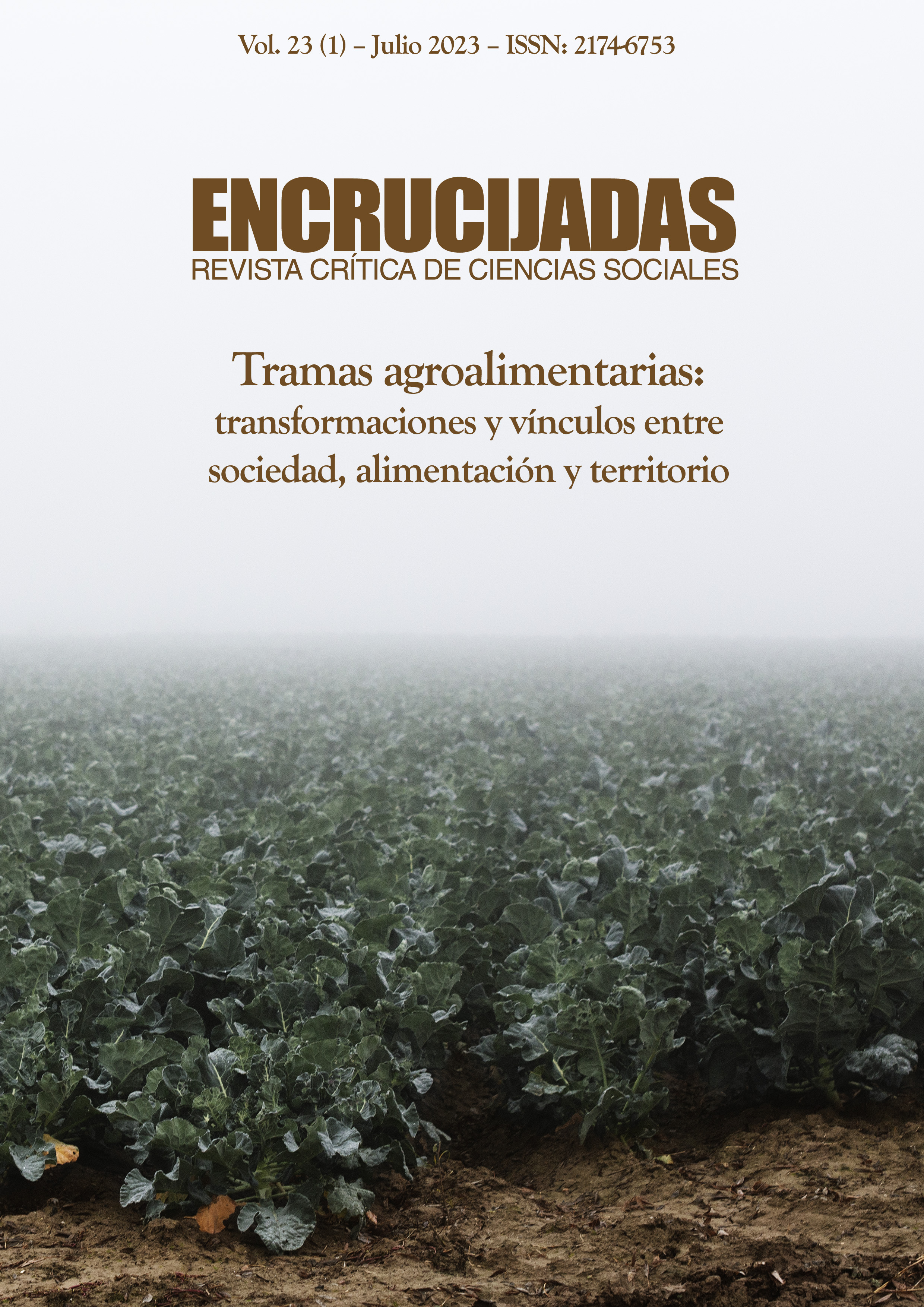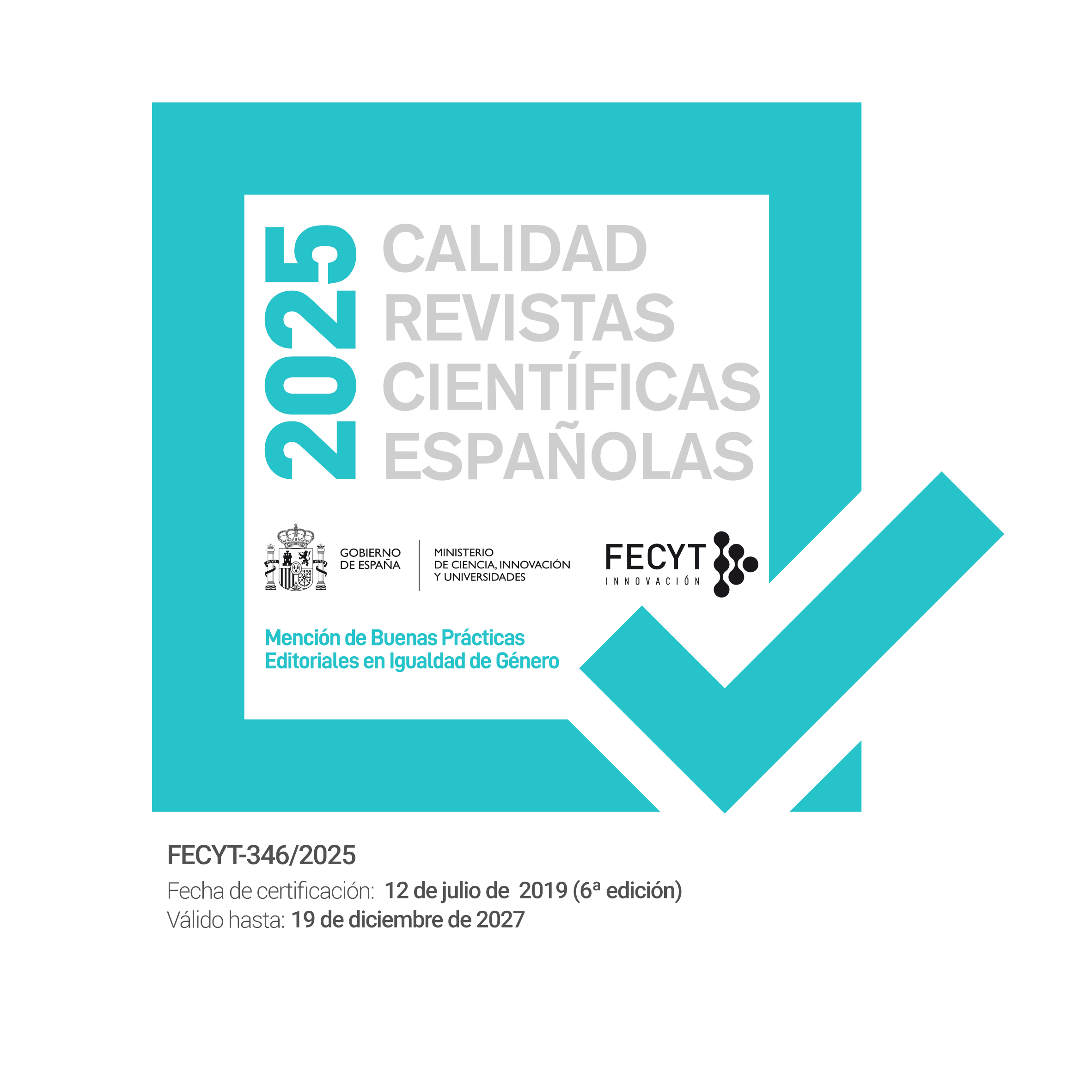The contradiction between cheap food and negative value within the development of farm sistems and food supply in capitalism
Keywords:
Cheap food, World-ecology, accumulation, negative value, agricultural revolutionsAbstract
During the historical period of the longue durée, during the development of world-ecology, in addition to the need of political processes at global level such as the primitive accumulation, obtaining the cheap four, such as Moore called it, was essential. Within these, cheap food is presented through the different agricultural revolutions by a combination of technical development, coercion and taking advantage of a concrete balance between accumulation by capitalization and by appropriation of work/energy from different social formations. Although it is true, despite the different crises of these agricultural revolutions, due to the structural tendency of the profit rate to fall due to the increase in the organic composition of capital, this historical system has always overcome them by seeking for new borders; the food price crisis of the early 21st century seems difficult to follow this successful path. This analysis seeks to unravel the epistemological bases that lead Moore to this conclusion, taking negative value as the guiding thread and his approach to the Marxist concept of social metabolism as theoretical framework.
Downloads
References
Akram-Lodhi, Haroon y Cristobal Kay (2010). Surveying the agrarian question (part 2): current debates and beyond. The Journal of Peasant Studies, 37(2), 255-284. https://doi.org/10.1080/03066151003594906
Arrighi, Giovanni y Beverly Silver (1999). Chaos and governance in the modern world system. University of Minnesota Press.
Bernstein, Henry (1996). Agrarian questions then and now. The Journal of peasant studies, 24(1-2), 22-59. https://doi.org/10.1080/03066159608438630
Burkett, Paul (1999). Marx and nature: A red and green perspective. Palgrave. https://doi.org/10.1057/9780312299651
Büscher, Bram y Robert Fletcher (2015). Accumulation by conservation. New political economy, 20(2), 273-298. https://doi.org/10.1080/13563467.2014.923824
Castree, Noel (2000). Marxism and the production of nature. Capital & Class, 24(3), 5-36. https://doi.org/10.1177/030981680007200102
Clark, Brett y John Bellamy Foster (2009). Ecological imperialism and the global metabolic rift: Unequal exchange and the guano/nitrates trade. International Journal of Comparative Sociology, 50(3-4), 311-334. https://doi.org/10.1177/0020715209105144
Costanza, Robert (1992). Ecological economics: the science and management of sustainability. Columbia University Press.
Daly, Herman y Joshua Farley (2011). Ecological economics: principles and applications. Island press.
de la Villa Hervás, Ismael (2022). La acumulación por desposesión y por conservación como dos caras de la misma moneda en la ecología-mundo. El caso de Brasil en el periodo post-Washington y post-Río 1992. Encrucijadas: Revista Crítica de Ciencias Sociales, 22(1), 6.
ETC (2009). Who will feed us? ETC Group 102 (noviembre), (enlace).
Foster, John Bellamy (1999). Marx's theory of metabolic rift: Classical foundations for environmental sociology. American Journal of Sociology, 105(2), 366-405. https://doi.org/10.1086/210315
Foster, John Bellamy y Paul Burkett (2006). Metabolism, energy, and entropy in Marx's critique of political economy: Beyond the Podolinsky myth. Theory and Society, 35, 109-156. https://doi.org/10.1007/s11186-006-6781-2
Foster, John Bellamy y Paul Burkett (2008). Classical Marxism and the second law of thermodynamics: Marx/Engels, the heat death of the universe hypothesis, and the origins of ecological economics. Organization & Environment, 21(1), 3-37. https://doi.org/10.1177/1086026607313580
Foster, John Bellamy y Hannah Holleman (2014). The theory of unequal ecological exchange: a Marx-Odum dialectic. Journal of Peasant Studies, 41(2), 199-233. https://doi.org/10.1080/03066150.2014.889687
Georgescu-Roegen, Nicholas (1975). Energía y mitos económicos. El trimestre económico, 42(168-4), 779-836.
Georgescu-Roegen, Nicholas (1986). The entropy law and the economic process in retrospect. Eastern Economic Journal, 12(1), 3-25.
Harvey, David (2018). A companion to Marx's Capital: The complete edition. Verso Books.
Holt, Alison; Anne Alix, Anne Thompson y Lorraine Maltby (2016). Food production, ecosystem services and biodiversity: We can't have it all everywhere. Science of the Total Environment, 573, 1422-1429. https://doi.org/10.1016/j.scitotenv.2016.07.139
Lenin, Vladimir Illich [1916] (2012). Imperialismo: la fase superior del capitalismo. Taurus. https://doi.org/10.9771/gmed.v4i1.9412
Levins, Richard y Richard Lewontin (1985). The dialectical biologist. Harvard University Press.
Luxemburgo, Rosa [1912] (1967). La acumulacion del capital. Grijalbo.
Marx, Karl [1867] (1975). El capital: Libro I. Siglo XXI.
Marx, Karl y Friedrich Engels (1974). La ideología alemana. Grijalbo.
Mayumi, Kozo (2002). The origins of ecological economics: the bioeconomics of Georgescu-Roegen. Routledge.
McMichael, Philip (1997). Rethinking globalization: the agrarian question revisited. Review of International PoIiticaI Economy, 4(4), 630-662. https://doi.org/10.1080/09672299708565786
Moore, Jason W. (2003). Capitalism as world-ecology: Braudel and Marx on environmental history. Organization & Environment, 16(4), 514-517. https://doi.org/10.1177/1086026603259091
Moore, Jason W. (2008). Ecological crises and the agrarian question in world-historical perspective. Monthly Review, 60(6), 54-63. https://doi.org/10.14452/MR-060-06-2008-10_5
Moore, Jason W. (2015). Capitalism in the Web of Life: Ecology and the Accumulation of Capital. Verso Books.
Moore, Jason W. (2017). Metabolic rift or metabolic shift? Dialectics, nature, and the world-historical method. Theory and Society, 46(4), 285-318. https://doi.org/10.1007/s11186-017-9290-6
Moore, Jason W. (2021). Opiates of the Environmentalists? Anthropocene Illusions, Planetary Management & The Capitalocene Alternative. Abstrakt (November).
Nikaido, Hiroshi (1983). Marx on competition. Zeitschrift für Nationalökonomie/Journal of Economics, 43(4), 337-362. https://doi.org/10.1007/BF01283185
Perelman, Mariano (2000). The invention of capitalism: Classical political economy and the secret history of primitive accumulation. Duke University Press. https://doi.org/10.1515/9780822380696
Saito, Kohei (2016). Marx's ecological notebooks. Monthly Review, 67(9), 25-42. https://doi.org/10.14452/MR-067-09-2016-02_3
Schmidt, Alfred (2014). The concept of nature in Marx (Vol. 8). Verso Books.
Schwartzman, David (2008). The limits to entropy: Continuing misuse of thermodynamics in environmental and Marxist theory. Science & Society, 72(1), 43-62. https://doi.org/10.1521/siso.2007.72.1.43
Shanin, Teodor (1980) Measuring peasant capitalism. En E. Hobsbawm et al. (eds.) Peasants in history. Essays in honour of Daniel Thorner (pp.89-104). Oxford University Press.
Smith, Neil [1984] (2010). Uneven development: Nature, capital, and the production of space. University of Georgia Press.
Steedman, Ian (1977). Marx after sraffa. NLB.
Wood, Ellen Meiksins (1981). The separation of the economic and political in capitalism. New Left Review, 127, 66-95.
World Obesity Federation (2023). World Obesity Atlas 2023. World Health Organization, (enlace).
Downloads
Published
How to Cite
Issue
Section
License
Copyright (c) 2023 Encrucijadas. Revista Crítica de Ciencias Sociales

This work is licensed under a Creative Commons Attribution-NonCommercial-NoDerivatives 4.0 International License.
Los autores/as conservan los derechos de autor y ceden a la revista el derecho de la primera publicación, con el trabajo registrado con la licencia de atribución de Creative Commons Reconocimiento-NoComercial (CC-BY 4.0), que permite a terceros utilizar lo publicado siempre que mencionen la autoría del trabajo y a la primera publicación en esta revista. Encrucijadas permite y se anima a todas las personas autoras a depositar la versión final publicada en repositorios institucionales o temáticos de acceso abierto, cumpliendo en caso necesario los términos establecidos por la entidad financiadora de la investigación.





